Charles E W Bean, Diaries, AWM38 3DRL 606/257/1 - 1916 - 1927 - Part 10
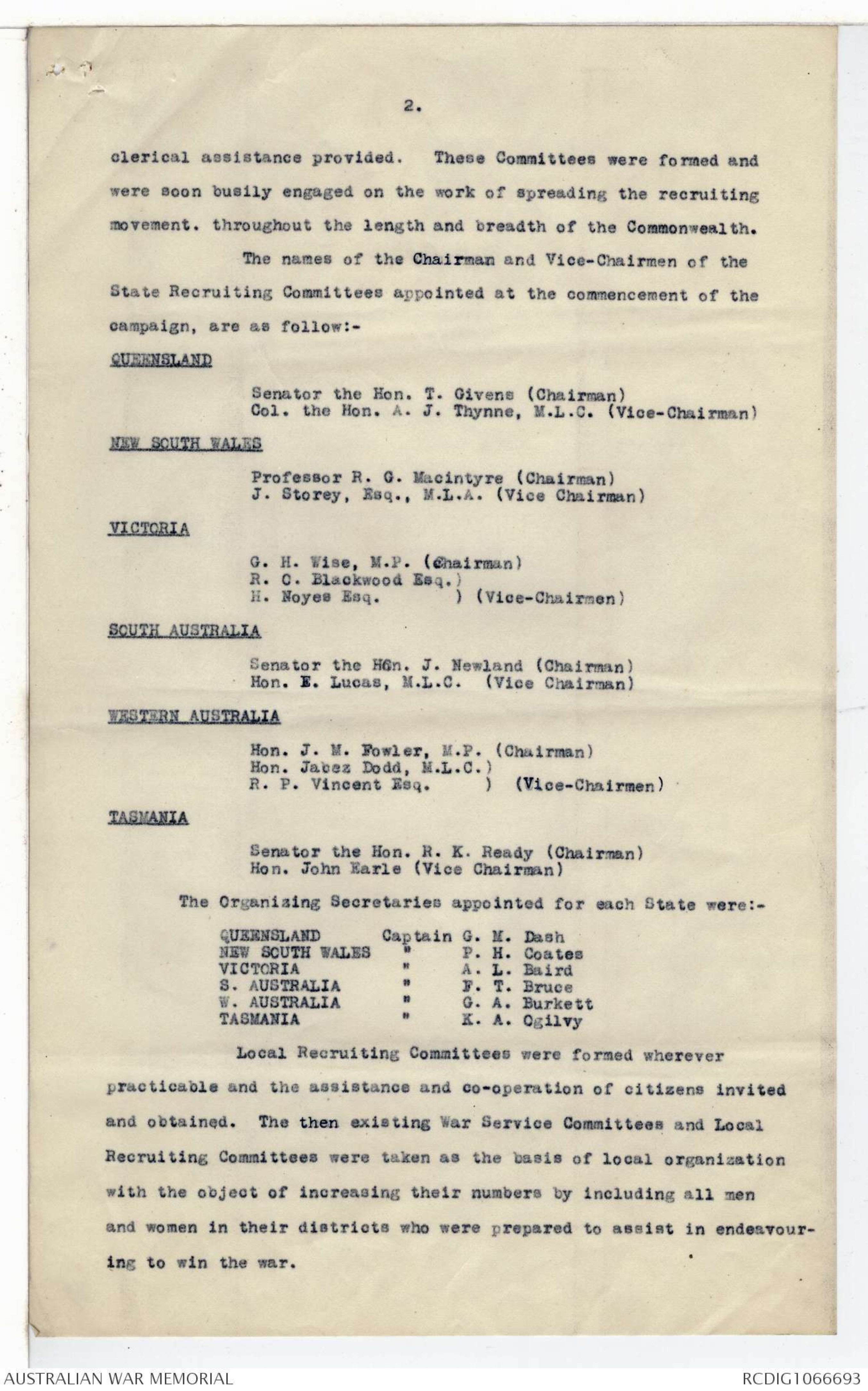
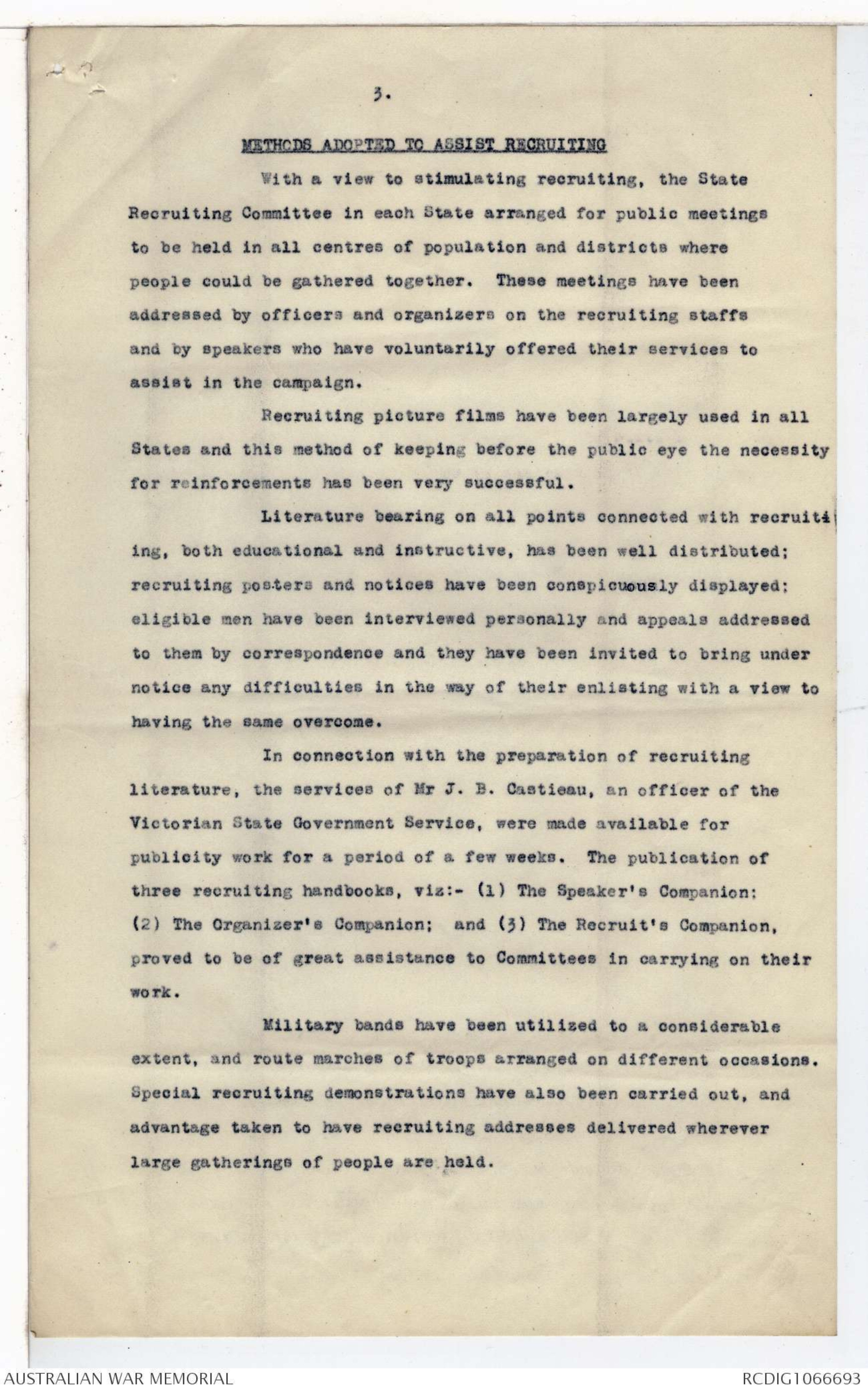
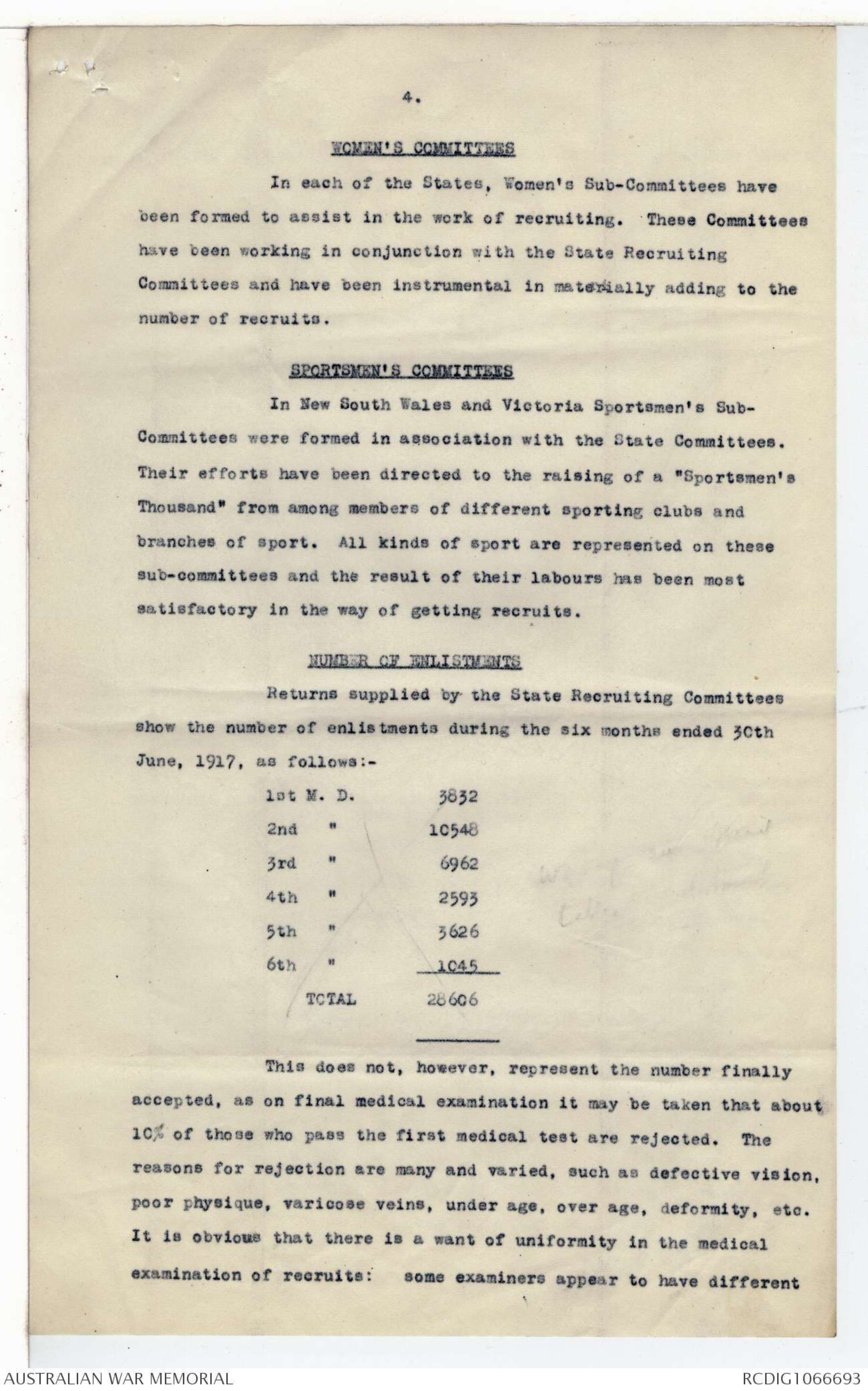
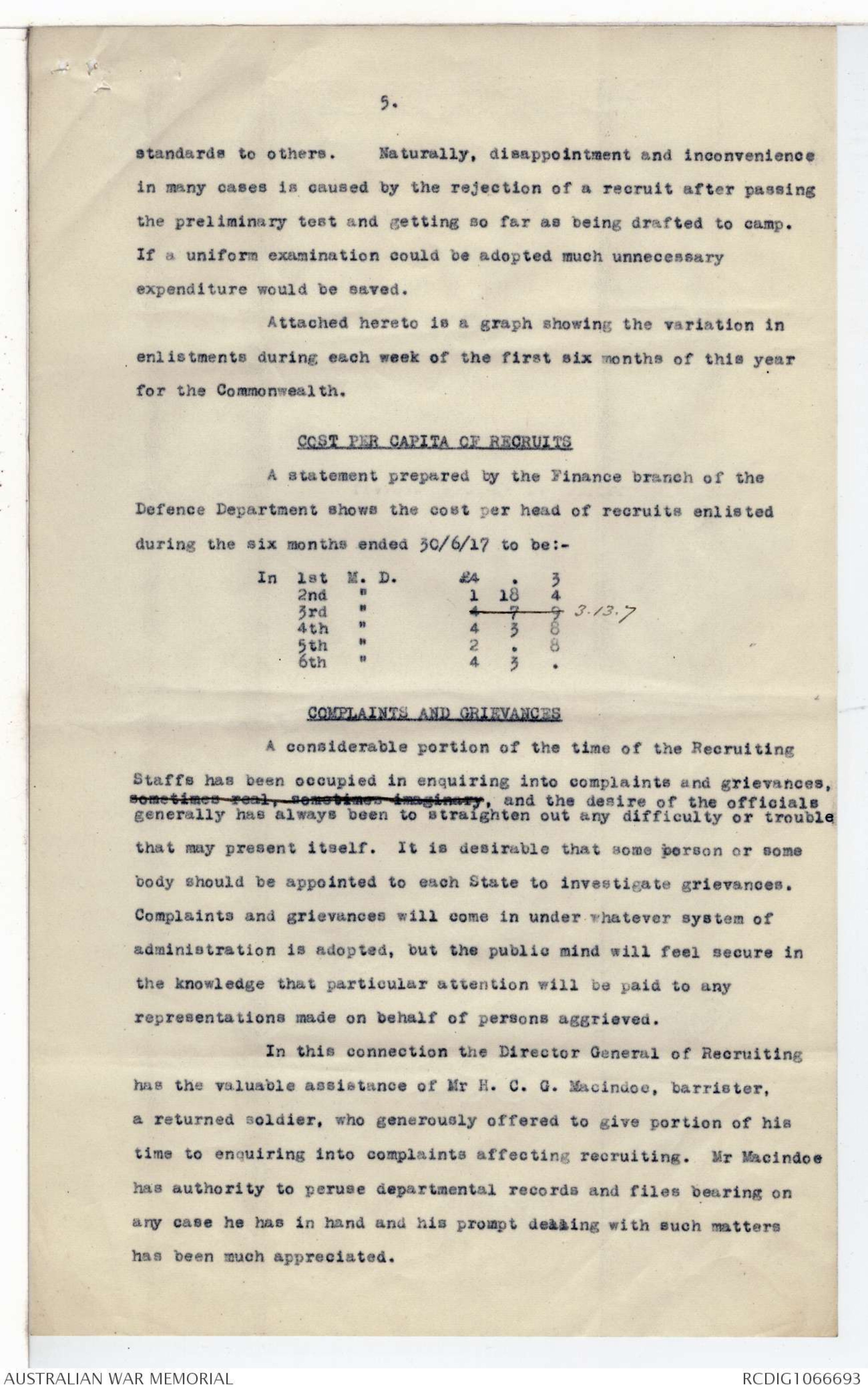
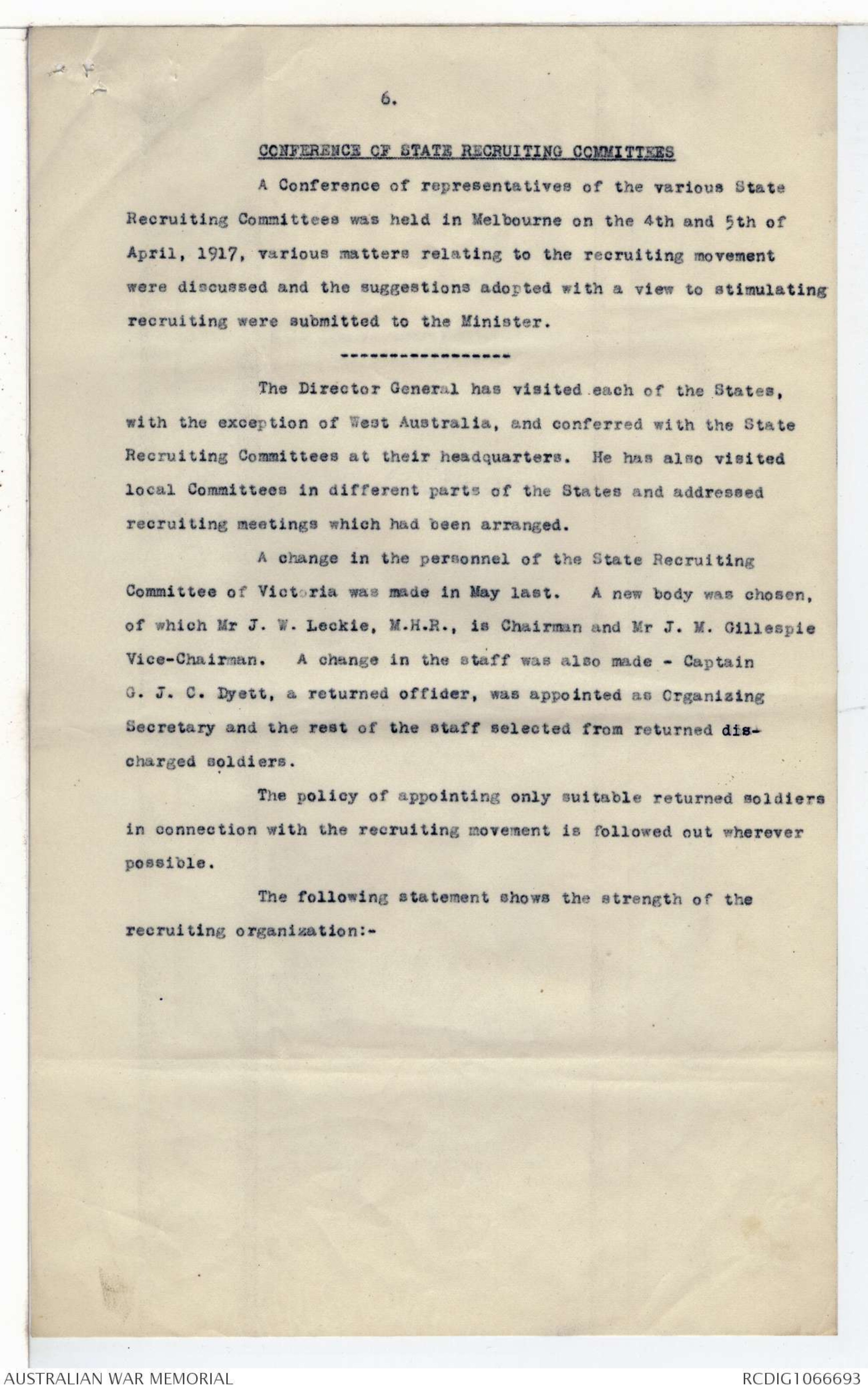
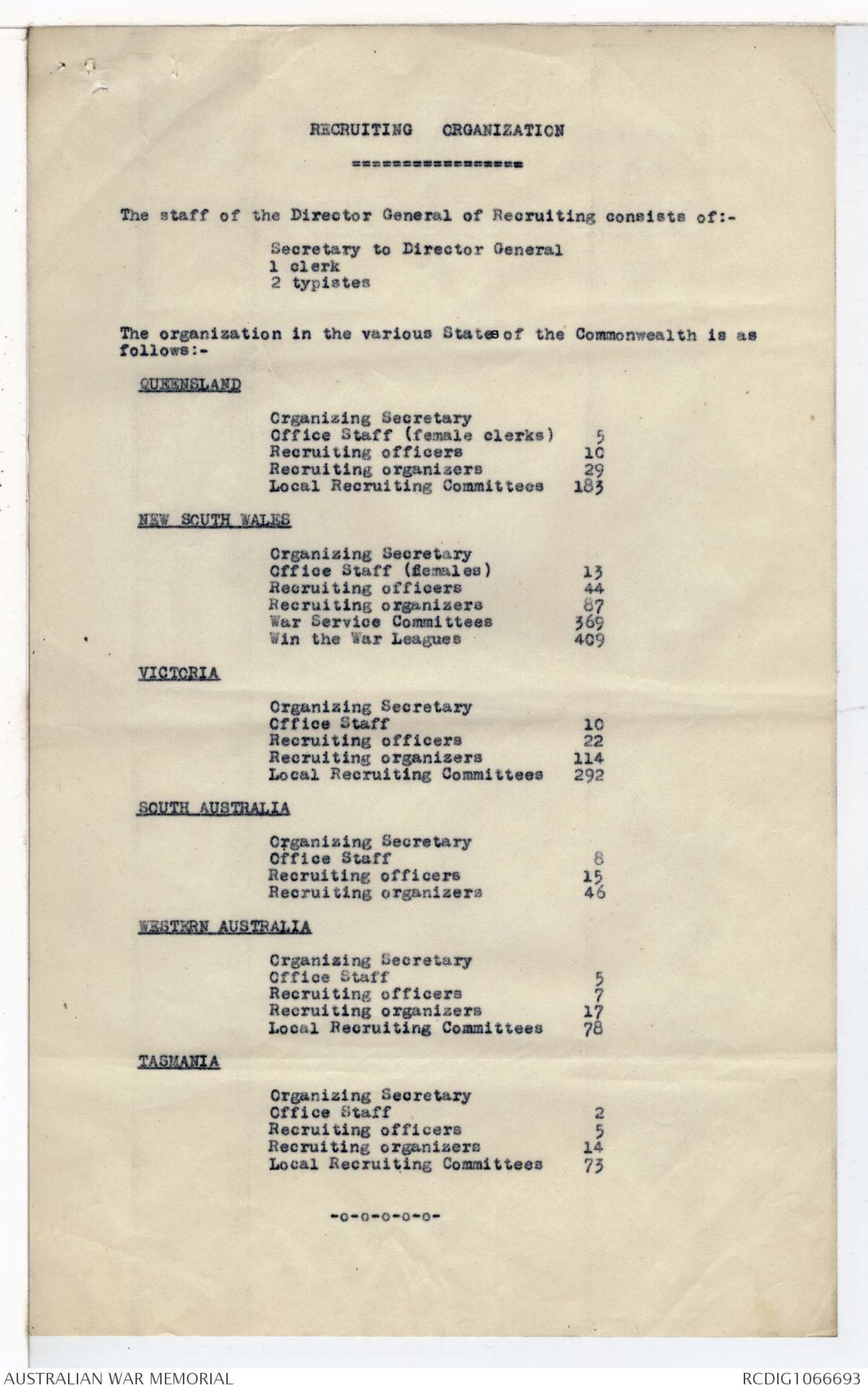
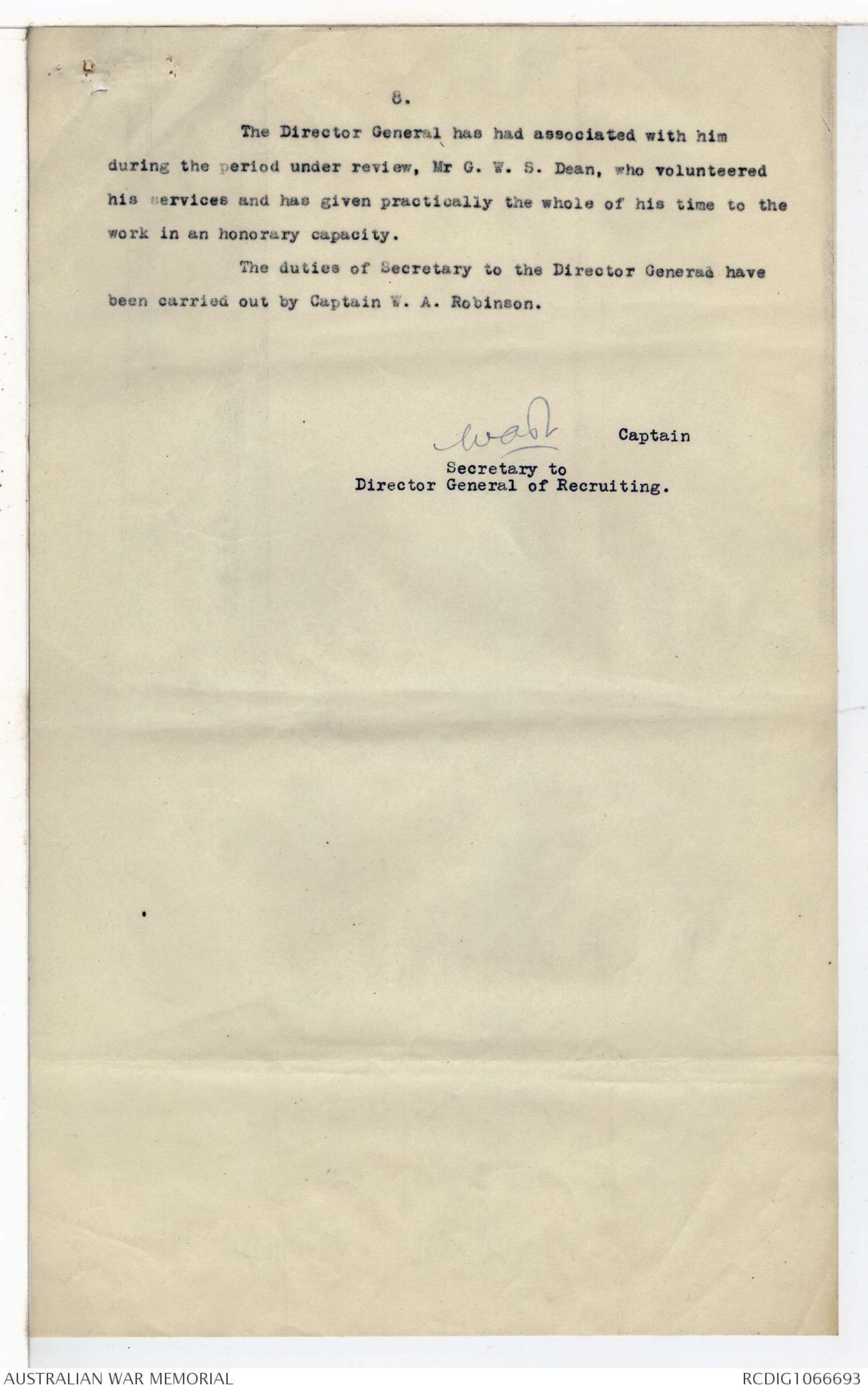
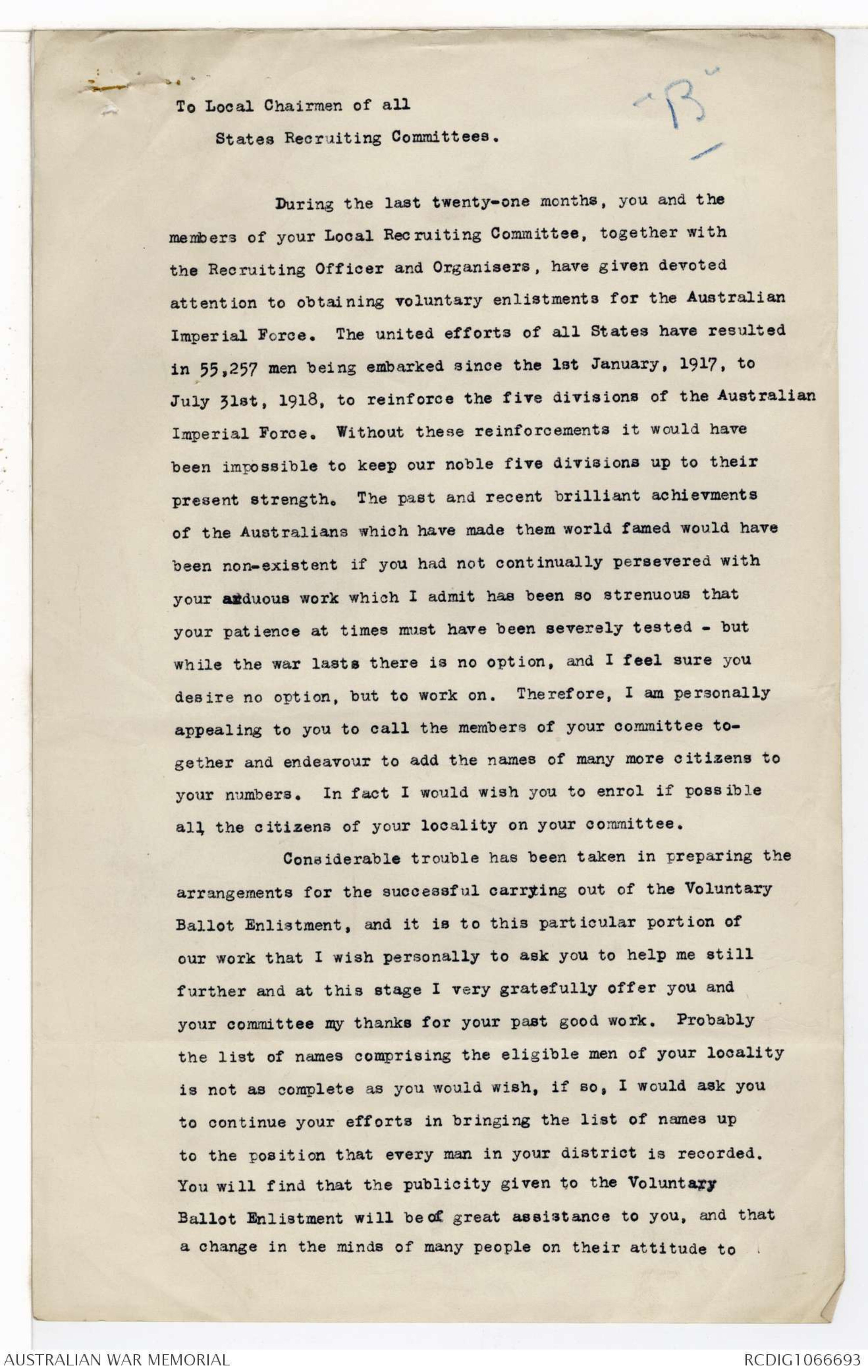
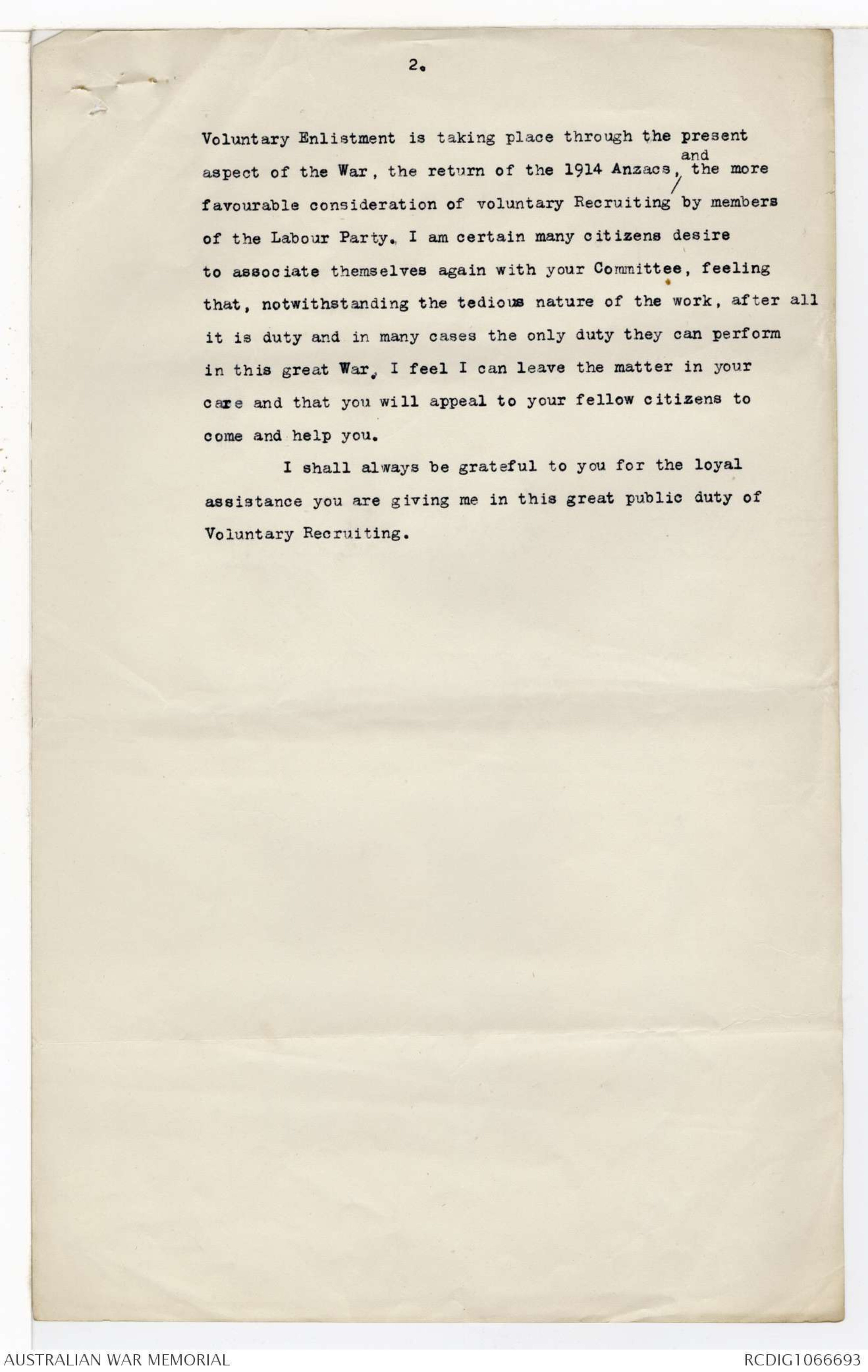
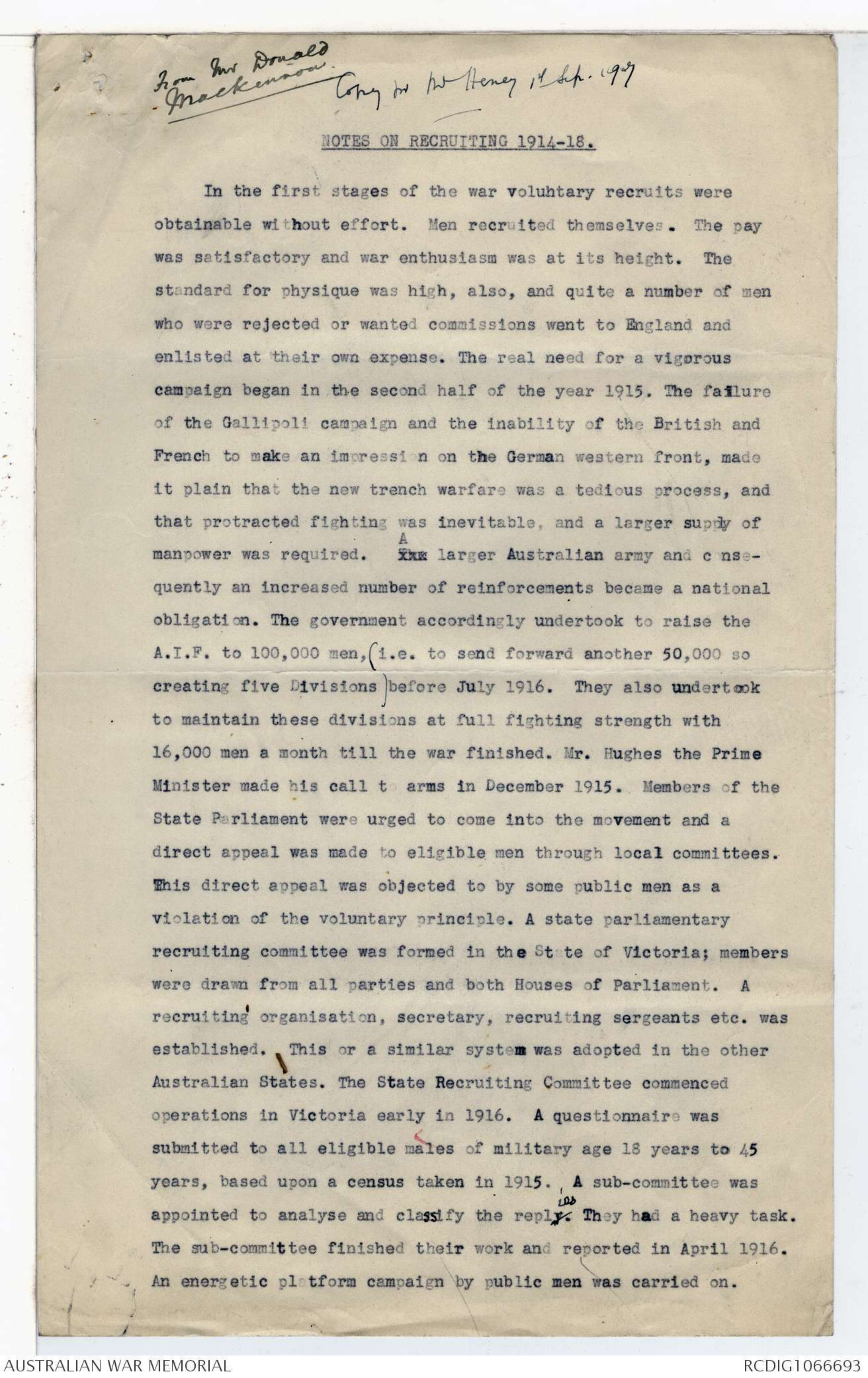
2.
clerical assistance provided. These Committees were formed and were soon busily engaged on the work of spreading the recruiting movement. throughout the length and breadth of the Commonwealth.
The names of the Chairman and Vice-Chairmen of the State Recruiting Committees appointed at the commencement of the campaign, as as follow:-
QUEENSLAND
Senator the Hon. T.Givens (Chairman)
Col. the Hon. A. J. Thynne, M.L.C. (Vice-Chairman)
NEW SOUTH WALES
Professor R. G. Macintyre (Chairman)
J. Storey, Esq., M.L.A. (Vice Chairman)
VICTORIA
G. H. Wise, M.P. (Chairman)
R. C. Blackwood Esq
H. Noyes Esq. (Vice Chairman)
SOUTH AUSTRALIA
Senator the Hon. J. Newland (Chairman)
Hon. E. Lucas, M.L.C. (Vice-Chairman)
WESTERN AUSTRALIA
Hon. J. M. Fowler, M.P. (Chairman)
Hon. Jabez Dodd, M.L.C.
R. P. Vincent Esq. (Vice-Chairmen)
TASMANIA
Senator the Hon. R. K. Ready (Chairman)
Hon. John Earle (Vice Chairman)
The Organising Secretaries appointed for each State were:-
QUEENSLAND. Captain G. M. Dash
NEW SOUTH WALES. " P. H. Coates
VICTORIA " A. L. Baird
S. AUSTRALIA " F. T. Bruce
W. AUSTRALIA " G. A. Burkett
TASMANIA " K. A. Ogilvy
Local Recruiting Committees were form wherever
practicable and the assistance and co-operation of citizens invited and obtained. The then existing War Service Committees and Local Recruiting Committees were taken as the basic of local organization with the object of increasing their numbers by incuding all men and women in their districts who were prepared to assist in endeavouring to win the war.
3.
METHODS ADOPTED TO ASSIST RECRUITING
With a view to stimulating recruiting, the State
Recruiting Committee in each State arranged for public meetings to be held in all centres of population and districts where
people could be fathered together. These meetings have been addressed by officers and organizers on the recruiting staffs
and by speakers who have voluntarily offered their services to
assist in the campaign.
Recruiting picture films have been largely used in all
States and this method of keeping before the public eye the necessity for reinforcements has been very successful.
Literature bearing on all points connected with recruit-
ing, both educational and instructive, has been well distributed;
recruiting posters and noticed have been conspicuously displayed;
eligible men have been interviewed personally and appeals addressed to them by correspondence and they have been invited to bring under notice any difficulties in the way of their enlisting with a view to having the same overcome.
In connection with the preparation of recruiting
literature, the services of Mr J. B. Castieau, an officer of the
Victorian State Goverment Service, were made available for
publicity work for a period of a few weeks. The publication of
three recruiting handbooks, viz:- (1) The Speaker's Companion:
(2) The organizer's Companion; and (3) The Recruit's Companion,
proved to be of great assistance to Committees in carrying on their
work.
Military bands have been utilized to a considerable extent, and route marches of troops arranged on different occasions.
Special recruiting demonstrations have also been carried out, and advantage taken to have recruiting address deliver wherever
large gatherings of people are held.
4.
WOMEN'S COMMITTEES
In each of the States, women's Sub-Committees have
been formed to assist in the work of recruiting. These Committees have been working in conjunction with the State Recruiting
Committees and have been instrumental in materially adding to the number of recruits.
SPORTSMEN'S COMMITTEES
In New South Wales and Victoria Sportsmen's Sub-
Committees were formed in association with the State Committees. Their efforts have been directed to the raising of a
"Sportsmen's Thousand" from among members of different sporting clubs and branches of sport. All kinds of sport are represented on these sub-committees and the result of their labours has been most satisfactory in the way of getting recruits.
NUMBER OF ENLISTMENTS
___________________________
Returns supplied by the State Recruiting Committees show the number of enlistments during the six months ended 30th June, 1917, as follows:-
1st M. D. 3832
2nd " 10548
3rd " 6962
4th " 2593
5th. " 3626
6th. " 1045
_________
TOTAL 28606
__________
This does not, however, represent he number finally
accepted, as on final medical examination it may be taken that about 10% of those who pass the first medical test are rejected. The reasons for rejection are many and varied, such as defective vision, poor physique, varicose veins, under age, over age, deformity, etc.
It is obvious that there is a want of uniformity in the medical examination of recruits: some examiners appear to have different
5.
standards to others. Naturally, disappointment and inconvenience in many cases is caused by the rejection of a recruit after passing the preliminary test and getting so far as being drafted to camp.
If a uniform examination could be adopted much unnecessary
expenditure would be saved.
Attached hereto is a graph showing the variation in enlistments during each week of the first six months of this year
for the Commonwealth.
COSTS PER CAPITA OF RECRUITS
A statement prepared by the Finance branch of the
Defence Department shows the costs per head of recruits enlisted
during the six months ended 30/6/17 to be:-
In 1st M. D. £4 . 3
2nd. " 1 18 4
3rd " 4. 7. 9 3. 13. 7
4th. " 4 3. 8
5th " 2 . 8
6th " 4 3. .
COMPLAINTS AND GRIEVANCES
A considerable portion of the time of the Recruiting Staffs has been occupied in enquiring into complaints and grievances sometimes real, sometimes imaginery, and the desire of the officials
generally has always been to straighten out any difficulty or trouble that may present itself. It is desirable that some person or some
body should be appointed to each State to investigate grievances.
Complaints and grievances will come in under whatever system of
administration is adopted, but the public mind will feel secure in
the knowledge that particular attention will be paid to any
representations made on behalf of person aggrieved.
In this connection the Director General of Recruiting
has the valuable assistance f M H. C. G. Macindee, barrister,
a returned soldier, who generously offered to give portion of his
time to enquiring into complaints affecting recruiting. Mr Macindee
has authority to peruse departmental records and files bearing on
any case he has in hand and his prompt dealing with such matters has been much appreciated.
6.
CONFERENCE OF STATE RECRUITING COMMITTEES
A Conference of representatives of the various State
Recruiting Committees was held in Melbourne on 4th and 5th of
April, 1917, various matters relating to the recruiting movement
were discussed and the suggestions adopted with a view to stimulating recruiting were submitted to the Minister.
----------------------------
The Director General has visited each of the States,
with the exception of West Australia, and conferred with the State
Recruiting Committees at their headquarters. He has also visited
local Committees in different part of the States and addressed
recruiting meetings which had been arranged.
A change in the personnel of the State Recruiting
Committee of Victoria was made in May last. A new body was chosen,
of which Mr J. W. Leckie, M.H.R., is Chairman and Mr J. M. Gillespie
Vice-Chairman. A change in the staff was also made - Captain
G. J. C. Dyett, a returned offider, was appointed as Organizing
Secretary and the rest of the staff selected from returned dis-
charged soldiers.
The policy of appointment only suitable returned soldiers
in connection with the recruiting movement is follow out wherever
possible.
The following statement shows the strength of the
recruiting organization:-
RECRUITING ORGANIZATION
----------------------------
The staff of the Director General of Recruiting consists of:-
Secretary to Direct General
1 clerk
2 typistes
The organization in the various States of the Commonwealth is as
follows:-
QUEENSLAND
Organizing Secretary
Office Staff (female clerks) 5
Recruiting officers 10
Recruiting organizers 29
Local Recruiting Committees. 183
NEW SOUTH WALES
Organizing Secretary
Office Staff (females) 13
Recruiting officers 44
Recruiting organizers 87
War Service Committees 369
Win the War Leagues 409
SOUTH AUSTRALIA
Organizing Secretary
Office Staff 8
Recruiting officers 15
Recruiting organizers 46
WESTERN AUSTRALIA
Organizing Secretary
Office Staff 5
Recruiting officers 7
Recruiting organizers 17
Local Recruiting Committees 78
TASMANIA
Organizing Secretary
Office Staff 2
Recruiting officers 5
Recruiting organizers 14
Local Recruiting Committees 73
-o-o-o-o-o-
8.
The Director General has had associated with him
during the period under review, Mr G. W. S. Dean, who volunteered
his services and has given practically the whole of his time to the
work in an honorary capacity.
The duties of Secretary to the Director General have
been carried out by Captain V. A. Robinson.
Captain
Secretary to
Director General of Recruiting.
To Local Chairmen of all
States Recruiting Committees.
During the last twenty-one months, you and the
members of your Local Recruiting Committee, together with
the Recruiting Officer and Organisers, have given devoted
attention to obtaining voluntary enlistments for the Australian
Imperial Force. The united efforts of all States have resulted
in 55,257 men being embarked since the 1st February, 1917, to
July 31st, 1981, to reinforce the five divisions of the Australian
Imperial Force. Without these reinforcements it would have
been impossible to keep our noble five divisions up to their
present strength. The past and recent brilliant achievements
of the Australians which have made them world famed would have
been non-existent if you has not continuing persevered with
your arduous work which I admit has been so strenuous that
your patience t times must have been severely tested - but
while the war lasts there is no option, and. I feel sure you
desire no option, but to work on. Therefore, I am personally
appealing to you to call members of your committee to-
gether and endeavour to add the names of many more citizens to
your numbers. In fact I would wish you to enrol if possible
all the citizens of your locality on your committee.
Considerable trouble has been taken in preparing the
arrangements for the successful carrying out of the Voluntary
Ballot Enlistment, and it is to this particular portion of
our work that I wish personally to ask you to help me still
further and at this stag I very gratefully offer you and
your committee my thanks for your past good work. Probably
the list list of names compromising the eligible men of your locality
is not as complete as you would wish, if so, I would ask you
to continue your efforts in bringing the list of names up
to the position that every many in your district is recorded.
You will find that the publicity given to the Voluntary
Ballot Enlistment will be of great assistance to you, and that
a change in the minds of many people to their attitude to
2.
Voluntary Enlistment is taking place through the present
aspect of the War, the return of the 1914 Anzacs, and the more
favourable consideration voluntary Recruiting by members
of the Labour Party. I am certain many citizens desire
to associate themselves again with your Committee, feeling
that, notwithstanding the tedious nature of the work, after all
it is duty and in many cases the only duty they can perform
in this great War, I feel I can leave the matter in your
cae and that you will appeal to your fellow citizens to
come and help you.
I shall always be grateful to you for the loyal
assistance you are giving me in this great public duty of
Voluntary Recruiting.
From Mr Donald
Mackinnon Copy for Mr Heney 17 Sep. 1917
NOTES ON RECRUITING 1914-18.
In the first stages of the war voluntary recruits were
obtainable with effort, Men recruited themselves. The pay
was satisfactory and war enthusiasm was at its height. The
standard for physique was high, also, and quite a number of men
who were rejected or wanted commissions went to England and
enlisted at their own expense. The real need for a vigorous
campaign began in the second half of the year 1915. The failure
of the Gallipoli campaign and the inability of the British and
French to make and an impression on the German western front, made it plain tht the new trench warfare was a tedious process, and
the protracted fighting was inevitable, and a larger supply of
manpower was required. A larger Australian army and conse-
quently an increased number of reinforcements became a national
obligatin. The government accordingly under took to raise the
A.I.F. to 100,000 men, (i.e. to send forward another 50,000 so
creating five Divisions) before July 1916. They also undertook
to maintain these divisions at full fighting strength with
16,000 men a month till the war finished. Mr. Hughes the Prime
Minister made his call to arms in December 1915. Members of the
State Parliament were urged to come into the movement and a
direct appeal was made to eligible men through local committees.
This direct appeal was objected to by some public men as a
violation of the voluntary principle. A state parliamentary
recruiting committee was form in the State of Victoria; members
were dran from all parties and both Houses of Parliament. A
recruiting organisation, secretary, recruiting sergeants etc. was
established. This or a similar system was adopted in the other
Australian States. The State Recruiting Committee commenced
operations in Victoria early in 1916. A questionnaire was
submitted to all eligible males of military age 18 years to 45
years, based upon a census taken in 1915. A sub-committee was
appointed to analyse and classify the replies. They had a heavy task.
The sub-committee finished their work and reported in April 1916.
An energetic platform campaign by public men was carried on.
 Sam scott
Sam scottThis transcription item is now locked to you for editing. To release the lock either Save your changes or Cancel.
This lock will be automatically released after 60 minutes of inactivity.